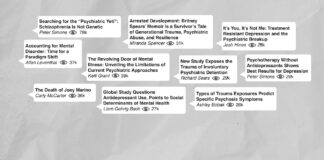Tag: alternative treatments for psychosis
Mad in America’s 10 Most Popular Articles in 2024
A roundup of Mad in America's most read blogs and personal stories of 2024 as chosen by our readers.
Shedding the Limits of “Severe Mental Illness” Labels
When people seeking help are relegated to “the Other,” how can they ever form a “therapeutic alliance”? Without collaboration, treatment devolves into coercion and oppression. We must change our language and relationships so new narratives can be born.
Minimal Medication Alternatives for Psychosis Needed
Researchers question the long-term use of antipsychotics and suggest increased research and investment in psychosocial interventions.
Dr. Russell Razzaque: Breaking Down is Waking Up
An interview with Dr. Russell Razzaque, consultant psychiatrist and associate medical director in east London who, together with colleagues, is leading a pioneering multi-centre Open Dialogue pilot in the UK National Health Service.
A New Mental Health System? Interview with Jim van Os
Dr. Jim van Os presents something unlike any other psychiatrist I have come across: a clear vision, and a pathway, for dismantling the existing mental health system and replacing it with something new that actually works. And he is doing it with all the status and prestige not only of a psychiatry insider, but as one of the world's leading scientists. Along with changes in the definitions of health and psychosis, van Os describes pilot programs now underway in The Netherlands to establish small, human-scale services — inspired by Open Dialogue — that engage the social network of people in distress. And, inspired by the best of the US "peer" movement, by involving people who have themselves recovered from madness in a treatment role.
Love is Dialogical: The Open Dialogue UK International Conference and Training
In the past five years, there has been a dramatic explosion of interest in the Open Dialogue Therapy practiced in Tornio, Finland. It is a humanistic “treatment” that has produced five-year outcomes for psychotic patients that are, by far, the best in the developed world, and there are now groups in the United States, Europe and beyond that are seeking to “import” this care. However, the challenges for doing so are many and, last month, Open Dialogue UK - on the occasion of the first-ever fully recognized Open Dialogue training outside of Tornio - organized a conference in London to hold an open dialogue about Open Dialogue.
Madness and the Family, Part III: Practical Methods for Transforming Troubled...
We are profoundly social beings living not as isolated individuals but as integral members of interdependent social systems—our nuclear family system, and the broader social systems of extended family, peers, our community and the broader society. Therefore, psychosis and other forms of human distress often deemed “mental illness” are best seen not so much as something intrinsically “wrong” or “diseased” within the particular individual who is most exhibiting that distress, but rather as systemic problems that are merely being channeled through this individual.
Madness and the Family (Part Two): Towards a Unified Theory of...
In Part One of this article series, we reviewed the contemporary research into the links between psychosis, problematic family dynamics, and other forms of childhood trauma. After reviewing this research, we find that a very interesting and important question emerges: What do all of these have in common? In other words, is there some common denominator that all of these types of trauma and patterns of problematic family dynamics share, a single underlying factor that makes someone particularly vulnerable to experiencing a psychotic crisis? Indeed, I believe that there is.
RAISE-ing Some Questions
All the media hubbub surrounding the recent publication of the RAISE study has been somewhat confusing. A sampler of headlines includes; Game Changer? (HuffPo); New Approach Advised to Treat Schizophrenia (New York Times); New York Times Issues Correction on RAISE Study Report; Landmark Study Recommends More Therapy, etc… What is one to make of all the fanfare and conflicting commentary?
The Recovery After an Initial Schizophrenia Episode (RAISE) Study: Notes from...
I was a psychiatrist who participated in the Recovery After an Initial Schizophrenia Episode Early Treatment Program (RAISE ETP). Although I welcomed the positive headlines that heralded the study's results, the reports left me with mixed feelings. What happened to render the notion that talking to people about their experiences and helping them find jobs or go back to school is something novel?
Vail Place Focuses on Collective Work for Mental Health
Minn Post did a feature story last week on Vail Place, an alternative mental health treatment center run on a community “clubhouse” model where the nearly 900 members and staff work side by side to run the center’s activities. Vail Place was founded in Hopkins, Minnesota in the early eighties by mental health activists and family members as a community for psychosocial rehabilitation. “The work isn’t therapy,” a member explains. “It’s growth. It’s ‘I cans’ rather than ‘I can'ts.’ And that’s important for mental health and survival.”














